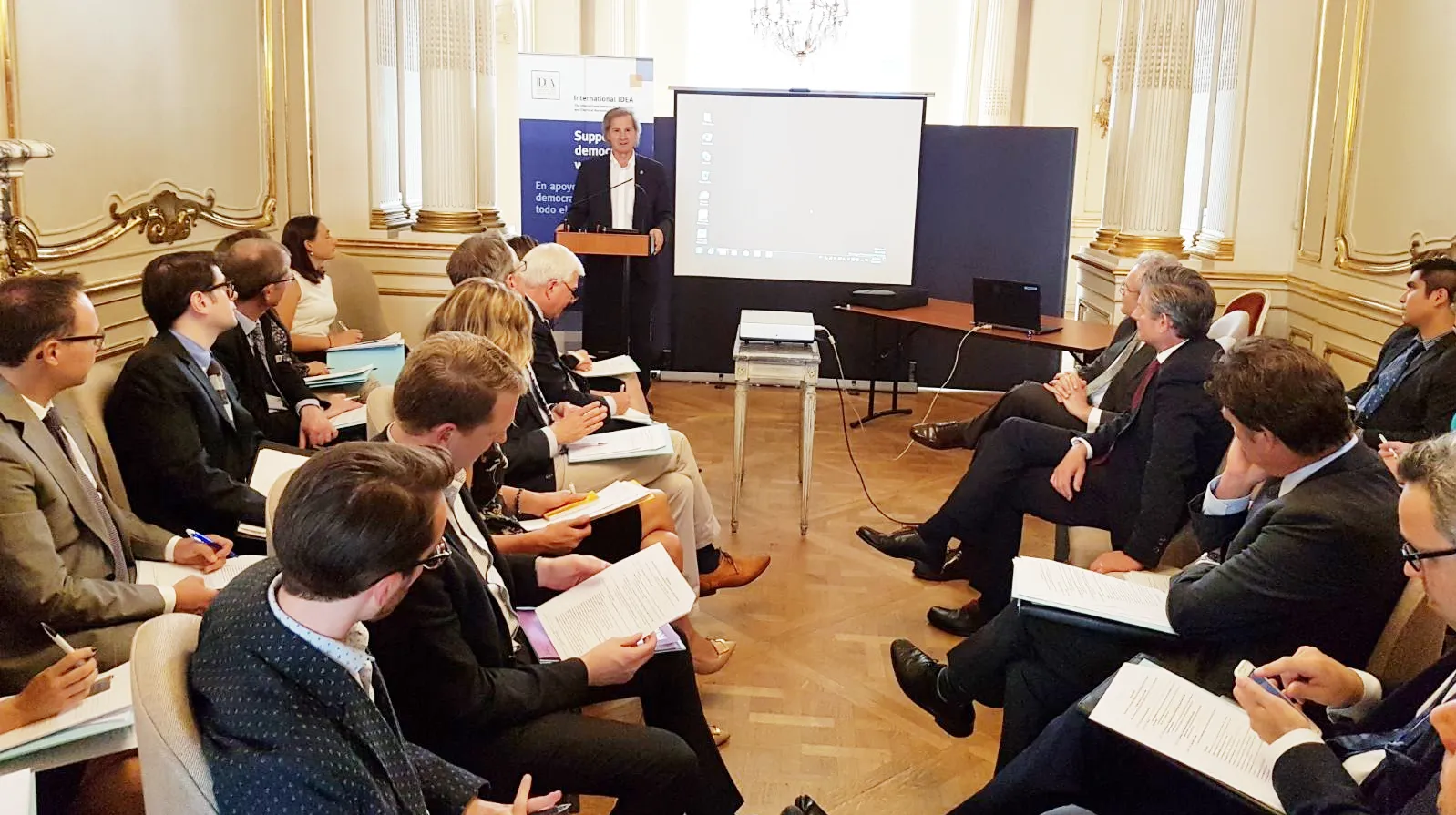Improving the EU’s political identity and democracy: Supporting European political parties to reunite with citizens

Democratic experiments such as the “Spitzenkandidaten” and individual European political party membership[1] are new to the EU political scene, and have both supporters and critics. Many hope that these new features will reinvigorate interest and enthusiasm for the 2019 EU elections, and make them more visible to citizens. European political parties are still far, however, from being the pan-European movements they aspire to be. The time seems right to reflect on their roles in the European polity.
To this end, the Office of International IDEA to the European Union, with the support of the Permanent Representation of Belgium to the European Union, organized a Roundtable on 13 July 2017, bringing together experts from European political parties and foundations, EU institutions, academics and civil society. The objective was to seek answers to questions related to the role of European political parties (Epps), their performance, communication, accountability and internal democracy, with a view to formulate recommendations to contribute to an improved connection between the Epps and citizens. This report summarizes the discussions during the Roundtable, marking the starting point of the programme that will be further developed by the Office of International IDEA to the EU during the second half of 2017.
Mission versus legal framework: reforming the European electoral system
Keynote Speaker, Jo Leinen, Member of the European Parliament, provided some insights to recent European Parliament (EP) initiatives on EU electoral reform - which to date, have not been the subject of political compromise within other institutions. The absence of an institutional response following the submission of the legislative initiative by the EP was quite telling in this perspective. Leinen argued that the United Nations (UN) faces comparable issues as the EU, and has similar problems to enforce democratic change. In 2015, a total of 16 proposals were made to reconnect Epps with citizens. They targeted longer election campaign periods, early voter registration, greater use of party logos, individual party membership, enhanced role for Spitzenkandidaten, and even structural changes such as the creation of transnational lists for the EP elections. Although the Estonian Presidency of the European Council is already the fifth EU Presidency to deal with the dossier, the odds are against its adoption before the 2019 EP elections.
Professor Steven Van Hecke (KU Leuven) provided some historical perspectives, but also spoke about relevant new realities such as the “En Marche” movement, with which Emmanuel Macron won the French presidency and general elections. Questions were asked on the political landscape formed by Epps, and whether they are flexible enough to adapt to new political forms and divides. Professor Van Hecke also touched upon the need to increase links between the EP, Epps and EU’s executive branch, the European Commission.
The Commission plans to table a reform proposal later in 2017; at the same time, participants were reminded about its limited ambition, due to time pressures and continued reluctance to bolster democracy at the pan-European level that might be perceived as an infringement of national sovereignty competences. This is despite the broadly shared consensus within the EP.
Political impact and effective campaigns
Representatives of Epps stated that the 2014 campaigns had the ambition to turn around the decrease in voter turnout for EP elections, and to generate an unprecedented media attention. Although Epps are strong in providing support to national member parties and their candidates, they need more legitimacy in the EU democratic process, which could happen only by adopting innovative legislation. Some Epps favor direct election of the Commission President and transnational lists for candidates, which presently fail to reach a political compromise and seems unrealistic in the near future. However, these are minimum requirements for the creation of a European debate, together with the need for additional financial resources to run campaigns at the pan-European level.
Some participants cautioned against upcoming reforms, as they might jeopardize the diversity in the political landscape, and make it more difficult for smaller parties to obtain accreditation. Inclusiveness and diversity are core aspects of democratic governance and must be promoted at the EU level; they are indispensable if the aim is to “hand power back to the citizens”. Participants mentioned the need for an introspective process for Epps to determine whether its full potential has been reached on impact and outreach, especially in the light of party-summit meetings and interactions with national parties.
Internal affairs and accountability: agreeing on sound standards and greater transparency
With regard to transparency, Epps have gone a long way. However, it is still difficult to evaluate results and the forthcoming publication on accreditation details and the origin and spending of funds will be unique in political party transparency.
For the Spitzenkandidaten appointment to become truly democratic, real competition is needed, a real debate, and real election power for members. To this end, parallel decision-making structures could facilitate the expression and weighing of individual members’ preferences.
The potential of Epps is not confined to EU borders. Recently, EU institutions and Epps showed interest in testing possible roles for Epps in Eastern neighbourhood countries, as political parties traditionally have considerable transformative powers, and this could be used in the framework of harmonization efforts in these countries to subscribe to EU values and norms.
Engagement of citizens is key to any democracy
It is a continuous challenge for any political actor at all policy levels to find new forms of citizen engagement. Recently, one could observe in many countries how fast and massively citizens can be mobilized around pioneering ideas or innovative political structures. It can be interesting to see whether any lessons can be drawn from these experiences to reinvigorate European democracy.
Among the ideas that were voiced during the Roundtable, several related to communication with citizens. Epps could explore further how to bring the message to national political parties, as they are closers to citizens; the same applies to members of the EP. Epps need regulatory flexibility to organize their structures and communication channels on all levels, which would allow for the building of trust. It was also suggested to separate election campaign budgets from general budgets in order to increase visibility and create a democratic level playing field.
Many challenges for Epps point to the need for regaining popular trust. Opinions can differ on which level this should best be pursued, considering the multi-level nature of these challenges, but it is clear that efforts to Europeanize political debate in Member States somehow could be useful. The EU democratic structures are not easily adaptable. On the short term, game-changing reforms are therefore unlikely, but Epps have, however, some margin for improved outreach within the existing frameworks. Through its programme on European political parties, the Office of International IDEA will attempt to support Epps in tapping into the available regulatory and practical space to reconnect with citizens.




